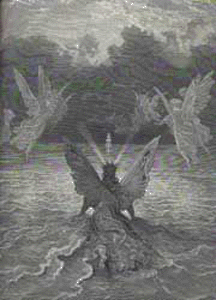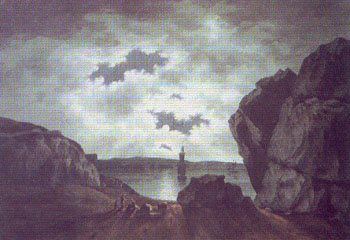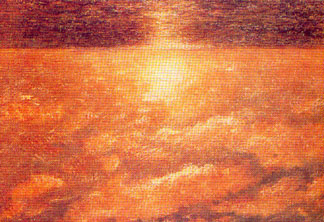Coleridge & Lord Byron



 |  |
 |
PART I
It is an ancient Mariner,
The Bridegroom's doors are opened wide,
He holds him with his skinny hand, The Wedding-Guest is spell-bound by the eye of the old seafaring man, and constrained to hear his tale.
He holds him with his glittering eye--
The Wedding-Guest sat on a stone :
`The ship was cheered, the harbour cleared, The Mariner tells how the ship sailed southward with a good wind and fair weather, till it reached the Line.
The Sun came up upon the left,
Higher and higher every day, The Wedding-Guest heareth the bridal music ; but the Mariner continueth his tale.
The bride hath paced into the hall,
The Wedding-Guest he beat his breast, The ship driven by a storm toward the south pole.
`And now the STORM-BLAST came, and he
With sloping masts and dipping prow,
And now there came both mist and snow, The land of ice, and of fearful sounds where no living thing was to be seen.
And through the drifts the snowy clifts
The ice was here, the ice was there,
Till a great sea-bird, called the Albatross, came through the snow-fog, and was received with great joy and hospitality.
It ate the food it ne'er had eat, And lo ! the Albatross proveth a bird of good omen, and followeth the ship as it returned northward through fog and floating ice.
And a good south wind sprung up behind ;
In mist or cloud, on mast or shroud, The ancient Mariner inhospitably killeth the pious bird of good omen.
`God save thee, ancient Mariner ! |
PART IIOut of the sea came he, Still hid in mist, and on the left Went down into the sea.
And the good south wind still blew behind, His shipmates cry out against the ancient Mariner, for killing the bird of good luck.
And I had done an hellish thing, But when the fog cleared off, they justify the same, and thus make themselves accomplices in the crime.
Nor dim nor red, like God's own head, The fair breeze continues ; the ship enters the Pacific Ocean, and sails northward, even till it reaches the Line.
The fair breeze blew, the white foam flew,
The ship hath been suddenly becalmed.
All in a hot and copper sky,
Day after day, day after day, And the Albatross begins to be avenged.
Water, water, every where,
The very deep did rot : O Christ !
About, about, in reel and rout A Spirit had followed them ; one of the invisible inhabitants of this planet, neither departed souls nor angels. They are very numerous, and there is no climate or element without one or more.
And some in dreams assur'd were
And every tongue, through utter drought, The shipmates, in their sore distress, would fain throw the whole guilt on the ancient Mariner : in sign whereof they hang the dead sea-bird round his neck.
Ah ! well a-day ! what evil looks |
PART IIIWas parched, and glazed each eye. A weary time ! a weary time ! How glazed each weary eye, When looking westward, I beheld A something in the sky. The ancient Mariner beholdeth a sign in the element afar off.
At first it seemed a little speck,
A speck, a mist, a shape, I wist ! At its nearer approach, it seemeth him to be a ship ; and at a dear ransom he freeth his speech from the bonds of thirst.
With throats unslaked, with black lips baked, A flash of joy.
With throats unslaked, with black lips baked, And horror follows. For can it be a ship that comes onward without wind or tide?
See ! see ! (I cried) she tacks no more !
The western wave was all a-flame. It seemeth him but the skeleton of a ship.
And straight the Sun was flecked with bars, And its ribs are seen as bars on the face of the setting Sun.
Alas ! (thought I, and my heart beat loud) The Spectre-Woman and her Death-mate, and no other on board the skeleton ship.
And those her ribs through which the Sun
Her lips were red, her looks were free, Death and Life-in-Death have diced for the ship's crew, and she (the latter) winneth the ancient Mariner.
The naked hulk alongside came,
The Sun's rim dips ; the stars rush out :
At the rising of the Moon,
The stars were dim, and thick the night, One after another.
One after one, by the star-dogged Moon, His shipmates drop down dead.
Four times fifty living men, But Life-in-Death begins her work on the ancient Mariner.
The souls did from their bodies fly,-- |
PART IV
`I fear thee, ancient Mariner !
I fear thee and thy glittering eye, But the ancient Mariner assureth him of his bodily life, and proceedeth to relate his horrible penance.
Alone, alone, all, all alone, He despiseth the creatures of the calm.
The many men, so beautiful ! And envieth that they should live, and so many lie dead.
I looked upon the rotting sea,
I looked to heaven, and tried to pray ;
I closed my lids, and kept them close, But the curse liveth for him in the eye of the dead men.
The cold sweat melted from their limbs,
An orphan's curse would drag to hell In his loneliness and fixedness he yearneth towards the journeying Moon, and the stars that still sojourn, yet still move onward ; and every where the blue sky belongs to them, and is their appointed rest, and their native country and their own natural homes, which they enter unannounced, as lords that are certainly expected and yet there is a silent joy at their arrival.
The moving Moon went up the sky,
Her beams bemocked the sultry main, By the light of the Moon he beholdeth God's creatures of the great calm.
Beyond the shadow of the ship,
Within the shadow of the ship Their beauty and their happiness. He blesseth them in his heart.
O happy living things ! no tongue The spell begins to break.
The self-same moment I could pray ; |
PART VBeloved from pole to pole ! To Mary Queen the praise be given ! She sent the gentle sleep from Heaven, That slid into my soul. By grace of the holy Mother, the ancient Mariner is refreshed with rain.
The silly buckets on the deck,
My lips were wet, my throat was cold,
I moved, and could not feel my limbs : He heareth sounds and seeth strange sights and commotions in the sky and the element.
And soon I heard a roaring wind :
The upper air burst into life !
And the coming wind did roar more loud,
The thick black cloud was cleft, and still The bodies of the ship's crew are inspired, and the ship moves on.
The loud wind never reached the ship,
They groaned, they stirred, they all uprose,
The helmsman steered, the ship moved on ;
The body of my brother's son But not by the souls of the men, nor by demons of earth or middle air, but by a blessed troop of angelic spirits, sent down by the invocation of the guardian saint.
`I fear thee, ancient Mariner !'
For when it dawned--they dropped their arms,
Around, around, flew each sweet sound,
Sometimes a-dropping from the sky
And now 'twas like all instruments,
It ceased ; yet still the sails made on
Till noon we quietly sailed on, The lonesome Spirit from the south-pole carries on the ship as far as the Line, in obedience to the angelic troop, but still requireth vengeance.
Under the keel nine fathom deep,
The Sun, right up above the mast,
Then like a pawing horse let go, The Polar Spirit's fellow-demons, the invisible inhabitants of the element, take part in his wrong ; and two of them relate, one to the other, that penance long and heavy for the ancient Mariner hath been accorded to the Polar Spirit, who returneth southward.
How long in that same fit I lay, Two voices in the air.
`Is it he ?' quoth one, `Is this the man ?
The spirit who bideth by himself
The other was a softer voice, |
PART VI
`But tell me, tell me ! speak again, SECOND VOICE
`Still as a slave before his lord,
If he may know which way to go ;
The Mariner hath been cast into a trance ; for the angelic power causeth the vessel to drive northward faster than human life could endure.
FIRST VOICE
`But why drives on that ship so fast, SECOND VOICE
`The air is cut away before,
Fly, brother, fly ! more high, more high ! The supernatural motion is retarded ; the Mariner awakes, and his penance begins anew.
I woke, and we were sailing on
All stood together on the deck,
The pang, the curse, with which they died, The curse is finally expiated.
And now this spell was snapt : once more
Like one, that on a lonesome road
But soon there breathed a wind on me,
It raised my hair, it fanned my cheek
Swiftly, swiftly flew the ship, And the ancient Mariner beholdeth his native country.
Oh ! dream of joy ! is this indeed
We drifted o'er the harbour-bar,
The harbour-bay was clear as glass,
The rock shone bright, the kirk no less, The angelic spirits leave the dead bodies.
And the bay was white with silent light,
And appear in their own forms of light.
Oh, Christ ! what saw I there !
This seraph-band, each waved his hand :
This seraph-band, each waved his hand,
But soon I heard the dash of oars,
The Pilot and the Pilot's boy,
I saw a third--I heard his voice : |
PART VII
This Hermit good lives in that wood
He kneels at morn, and noon, and eve--
The skiff-boat neared : I heard them talk, Approacheth the ship with wonder.
`Strange, by my faith !' the Hermit said--
I never saw aught like to them,
`Dear Lord ! it hath a fiendish look--
The boat came closer to the ship, The ship suddenly sinketh.
Under the water it rumbled on, The ancient Mariner is saved in the Pilot's boat.
Stunned by that loud and dreadful sound,
Upon the whirl, where sank the ship,
I moved my lips--the Pilot shrieked
I took the oars : the Pilot's boy,
And now, all in my own countree, The ancient Mariner earnestly entreateth the Hermit to shrieve him ; and the penance of life falls on him.
`O shrieve me, shrieve me, holy man !'
Forthwith this frame of mine was wrenched And ever and anon through out his future life an agony constraineth him to travel from land to land .
Since then, at an uncertain hour,
I pass, like night, from land to land ; What loud uproar bursts from that door ! The wedding-guests are there.
But in the garden-bower the bride
O Wedding-Guest ! this soul hath been
O sweeter than the marriage-feast,
To walk together to the kirk, And to teach, by his own example, love and reverence to all things that God made and loveth.
Farewell, farewell ! but this I tell
He prayeth best, who loveth best
The Mariner, whose eye is bright,
He went like one that hath been stunned, |
2) What "hellish thing" does the Mariner do? How do the other sailors at first react to this deed? What changes their minds? 3) Who is the crew of the strange ship that appears in Part III? What happens to the Mariner's shipmates soon after the appearance of this ship? 4) What changes take place in the Mariner in Part IV? What burden is he freed of as a result of these changes? 5) According to the margin notes in Part V, what force causes the ship to move? Who serves as the crew of the ship on this leg of its journey? What force takes control of the ship at the equator? 6) What does the Mariner hope the Hermit will do for him? 7) What is the Mariner's lifelong penance? 8) What do you think the Albatross symbolizes, or stands for? Find evidence to support your answer. 9) In what ways might the journey of the Mariner be seen as spiritual as well as actual? 10) Some of the events Coleridge describes are realistic and others are fantasy. Why does he include these different elements within the same poem? |
A stately pleasure-dome decree : Where Alph, the sacred river, ran Through caverns measureless to man Down to a sunless sea. So twice five miles of fertile ground With walls and towers were girdled round : And there were gardens bright with sinuous rills, Where blossomed many an incense-bearing tree ; And here were forests ancient as the hills, Enfolding sunny spots of greenery.
|
2) What, according to the second stanza, wasforced up through "that deep romantic chasm"? 3) What did Kubla Khan hear in the noise made by the river emptying into the ocean? 4) According to the last stanza, what did the speaker once see in a vision? What part of that vision does the speaker wish he could revive and for what purpose? 5) Using your own words, what does the speaker say would happen to him and "all who heard" if he were able to revive his vision? 6) What statement do you think Coleridge is making here about the power of imagination? 7) Do you feel that Coleridge's imagination and "music" combine to make his vision seem real for the reader? |
Of cloudless climes and starry skies; And all that's best of dark and bright Meet in her aspect and her eyes: Thus mellowed to that tender light Which Heaven to gaudy day denies.
One shade the more, one ray the less,
And on that cheek, and o'er that brow, |
2) What color is the lady's hair? 3) What do you think is the meaning of "that tender light" in line 5? 4) What does the speaker believe the woman's appearance reveals about her character? 5)Why was nature a logical choice for Byron as something with which to compare a lady's beauty? Why would it be a logical choice for any comparison by Byron? |
So late into the night, Though the heart be still as loving, And the moon be still as bright.
For the sword outwears its sheath,
Though the night was made for loving, |
2) What do you think is meant by the line "And the soul wears out the breast"? Why must the heart "pause to breathe"? 3) Why will the speaker "go no more a-roving"? How might you summarize in one sentence the speaker's message? 4) Which properties of the Romantic spirit are evident in this poem? |
There is a rapture on the lonely shore, There is society, where none intrudes, By the deep sea, and music in its roar; I love not man the less, but nature more, From these our interviews, in which I steal From all I may be, or have been before, To mingle with the universe, and feel What I can ne'er express, yet cannot all conceal.
Roll on, thou deep and dark blue ocean-roll!
His steps are not upon thy paths-thy fields
The armaments which thunderstrike the walls
Thy shores are empires, changed in all save thee-
Thou glorious mirror, where the Almighty's form
And I have loved thee, ocean! and my joy |
2) How does he say the ocean treats such things as warships and sea monsters? 3) What childhood memories of the ocean does the speaker have? 4) In line 10, the speaker describes the movement of ships over the ocean as "in vain." What might he mean by this? 5) What property of the ocean does the speaker admire in the fifth stanza? 6) What double meaning might the speaker have intended in his reference to the ocean as a glorious mirror in line 46? |
(I wonder what it will be like at forty? I thought of a peruke the other day) -- My heart is not much greener; and, in short, I Have squander'd my whole summer while 't was May, And feel no more the spirit to retort; I Have spent my life, both interest and principal, And deem not, what I deem'd, my soul invincible.
No more -- no more -- Oh! never more on me
No more -- no more -- Oh! never more, my heart,
My days of love are over; me no more
Ambition was my idol, which was broken
What is the end of Fame? 't is but to fill
What are the hopes of man? Old Egypt's King
But I being fond of true philosophy,
Still gentler purchaser! the bard -- that's I --
"Go, little book, from this my solitude! |
2) What, according to lines 17 and 18 does the speaker say has been his "sole world" and "universe" up until now? According to the fourth stanza, with what "old-gentlemanly vice" will he replace it? 3) In the fifth stanza, the speaker notes that glittering youth" is a "chymic, " or counterfeit, "treasure," In what way do you think he means this? 4) Summarize the point the speaker is making when he uses Cheops as an example. |